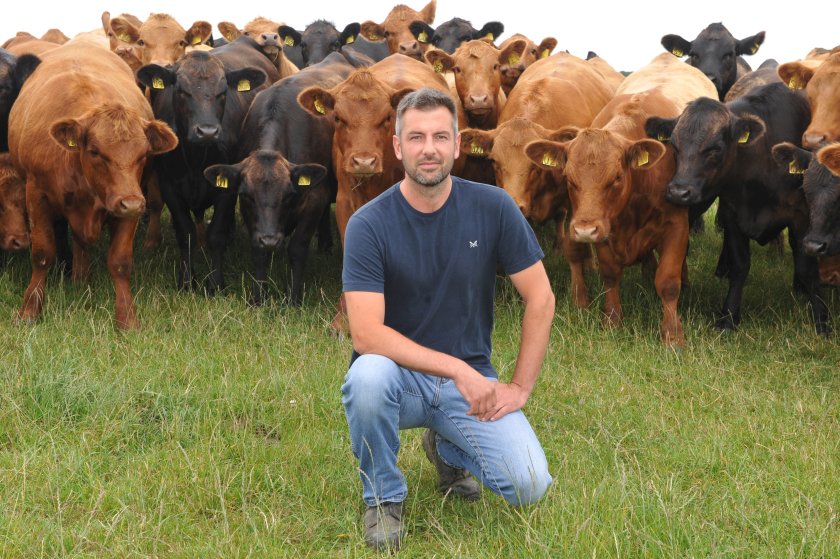
Harri Parri and his family farm 293 hectares across three holdings on the Llyn Peninsula (Photo: Farming Connect)
A nutrient management plan has allowed one Welsh livestock farm to maintain a grass crop and arable produce while reducing its reliance on synthetic fertiliser.
Harri Parri and his family farm 293 hectares across three holdings on the Llyn Peninsula, where they run a suckler herd of beef cattle Stabilisers, a flock of New Zealand Lleyn and Lleyn x Suffolk ewes and 32,000 field chickens.
In 2021, the business was awarded funding from the Welsh government's Farming Connect Advisory Service to partially pay for a Nutrient Management Plan.
The funding was used to inform appropriate nutrient breakdown decisions for fields.
Since then, targeting those breakdowns and better managing backyard manure and chicken manure has allowed the farm to halve the amount of fertiliser it buys.
Harri said his business had reduced input costs while continuing to maintain yields in his off-shore crops.
"We have an abundance of potash and phosphate derived from the poultry," he said, "through soil testing and nutrient management plans, we are better able to use it which means we don't need to buy potash and chemical phosphate, just nitrogen or urea.
Forty hectares of barley, oats and forage beet are grown in a rotation of four or five years to reduce the risk to the business against high feed prices.
The majority of arable crops are grown with very little nitrogen in bags.
Running a mixed farming enterprise builds resilience in the soil, allowing yields of more than 3t/acre to be captured from barley without the input purchased.
Most of Harri's fields have a P and K index of 2 or 3 and pH across farm averages of 6.1.
Soil testing leads the business on the nutrient needs of fields, to inform decisions about where manure needs to be targeted.
For the past six years, Harri has used pellet-style lime rather than conventional lime to raise soil pH levels after attending a Farming Connect open day where this method was discussed.
He said open days like these were useful to gain knowledge of new ideas or reinforce existing practices.
"I get an insight into these events and in the Farming Connect beef and sheep and poultry discussion groups that I am a member of," Harri said.
"As a beef and sheep group, we were keen to introduce a business element and we had the flexibility to do this and expand our range of speakers."
The discussion groups meet four or five times a year, and have been facilitated by the Local Development Officer.
When the family set up the free range egg business they had limited knowledge of poultry, so being part of a discussion group has been helpful.
Harri and his staff have taken advantage of training courses funded by Farming Connect, from poultry training required by British Lion Code to the safety of a telescopic pickup truck for rough terrain (telehandler) and a quad bike all funded up to 80%.
As a farmer, Harri said he saw the development of the business by phasing out new ideas as the way forward.
"If you're constantly developing, instead of revolutionising and changing everything overnight, the system moves with you, it all slots into place," he said.
"We always question what we're doing to make sure we're doing everything as well as we can.''





